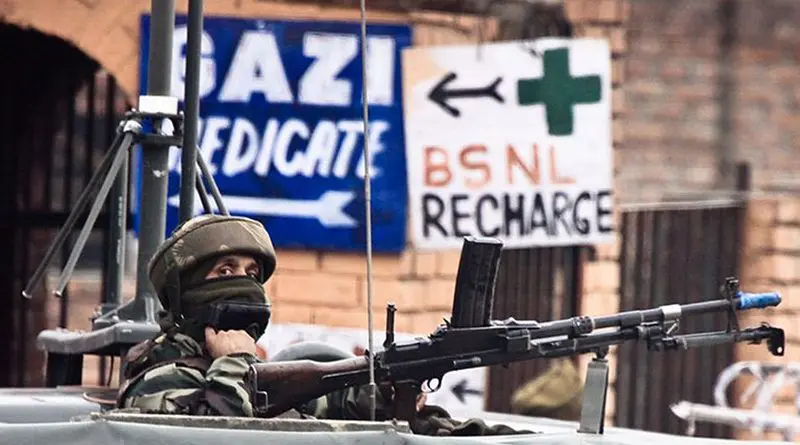Kashmir Still Roiled In Conflict – Analysis
By Ayesha Ray*
Close to a year-and-a-half since the revocation of Kashmir’s autonomy on 5 August 2019, India continues to smother Kashmir under repression. Severe restrictions during the COVID-19 pandemic — including the termination of internet and communications — displayed disregard for basic humanity by the world’s largest democracy.
Although the government has released a significant number of Kashmiris, 400 remain in custody under the Public Safety Act that allows individuals to be detained for two years without trial. Kashmiri journalists who are critical of the government’s clampdown on freedom of speech and movement are routinely detained, harassed and silenced in what is a chapter straight out of an authoritarian playbook.
The revocation of Article 370 of the Indian constitution, which allowed Kashmir a degree of autonomy, was perhaps the Indian government’s most undemocratic move against Kashmiris. The decision was made overnight, without consultation or political engagement with Kashmir’s various political entities. Feelings of betrayal and alienation now run deep among Kashmiris, who find no reason to place their trust in the central government.
The government’s declaration of Union territory status for Ladakh was another unilateral step taken without consultation of its residents. An increasing number of people in Leh are now echoing the fears expressed in Kargil in August 2019 about political representation, safeguards for land ownership, job security, domicile status and protection under Schedule Six of the Indian constitution.
Fears of wholesale demographic change are not unfounded. Under a new policy called the J&K Development Act, the term ‘permanent resident’ has been omitted. This allows outsiders to invest in Kashmir. As of September 2020, over 1.6 million residency certificates had been issued across the districts of Jammu and Kashmir. And under a new vague clause in the same act, corps commanders have been given special powers to declare an area ‘strategic’ for operational and training requirements. The rationale for declaring these areas strategic is unclear. For a state that aspires to live free of Indian military presence, these developments are cause for deep suspicion.
The Modi government has been quick to silence criticism, forcing organisations like Amnesty International India to shut down operations in the country. In September 2020 India’s Enforcement Directorate froze Amnesty’s financial accounts after the group published reports critical of the government’s human rights record. Contrary to the Modi government’s promise of peace, prosperity and development — made in justification of revoking Kashmir’s autonomy — the reality presents an abnormal picture of denial, despair, absence of political engagement and a crippled economy.
After more than 14 months of illegal detention and confinement in their homes, some of Kashmir’s mainstream political leaders were released. Their release introduces new complexities in an altered political landscape. New alliances and political partnerships are emerging, many of which are united in their efforts to reinstate Article 370 and statehood for Kashmiris. Others are creating their own individual spaces in electoral politics, with a few maintaining their allegiance to the Congress or Bharatiya Janata Party (BJP).
Three external states wielding influence on Kashmir in international diplomacy are Pakistan, China and peripherally, the United States.
The continued COVID-19 lockdown in Kashmir gave a tremendous boost to Pakistan’s confidence. In the aftermath of the lockdown, Pakistan’s Prime Minister Imran Khan raised the issue at the United Nations, urging the international community to take serious note of the India’s military siege of Kashmir. Senior officials in his administration ramped up the rhetoric. The Pakistani state has since taken a number of steps to establish greater influence and control over the region. These steps to change the status of Kashmir are likely to heighten tensions between India and Pakistan and be detrimental to the long-term security of both Kashmiri and Indian civilians.
Pakistan’s strategic alliance with China should give some pause to policymakers in New Delhi. After India stripped Kashmir of autonomy in August 2019, China came out openly in support of Pakistan. In a statement, Chinese President Xi Jinping supported Pakistan’s safeguarding of its rights and hoped that the dispute would be resolved through peaceful dialogue.
China and Pakistan also share a deep strategic interest in the China Pakistan Economic Corridor, a US$60 billion infrastructure project that China has launched as part of its Belt and Road Initiative. The strong relationship China and Pakistan have forged over Kashmir takes on greater relevance in the context of recent border clashes between China and India in the Galwan and Pangong Tso areas of Ladakh.
Following US President Donald Trump’s defeat, all eyes are now set on the new US administration’s approach to Kashmir.
The Biden administration, while maintaining its strategic, defence and economic partnership with India, seems likely to adopt a more persuasive approach on the subject of human rights. Official statements on the Biden–Harris Transition Website refer to both Kashmir and the Citizenship Amendment Act protests. Both incoming US president Joe Biden and vice president Kamala Harris have been strongly critical of the Modi government’s human rights record in India and Kashmir.
In the absence of political engagement from New Delhi, the future is likely to hold further violence and conflict. This will destroy the lives of ordinary Kashmiris caught in a conflict involving militants and India and Pakistan’s competing territorial ambitions.
*About the author: Ayesha Ray is Associate Professor in the Department of Political Science at King’s College, Pennsylvania.
Source: This article was published by East Asia Forum. An extended version of this article appears in the most recent edition of East Asia Forum Quarterly, ‘How China is changing’, Vol. 12, No. 4.

